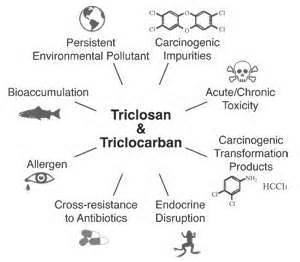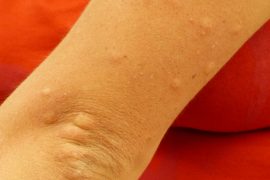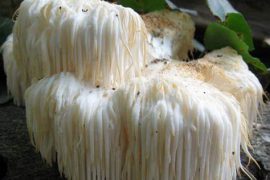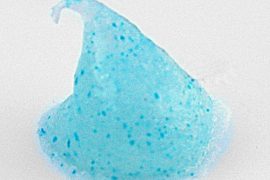If you take a look at the label on your anti-bacterial soap, you may see the chemical triclosan listed. If you haven’t heard of triclosan, you should know that is in a number of products that you may be using on a daily basis. Triclosan was introduced to the marketplace in 1972, although it was originally developed and registered as a pesticide in 1969. (1) At that time it was used in hospitals and health care settings for its antibacterial properties.
Triclosan is found in numerous products such as: soaps, hand-washes, dish-washing products, laundry detergents, plastics (e.g., toys, cutting boards, kitchen utensils) toothpaste and mouth washes, deodorants and antiperspirants, cosmetics and shaving creams, acne treatment products, hair conditioners, bedding, trash bags, socks and undershirts, hot tubs, plastic lawn furniture, impregnated sponges, surgical scrubs, implantable medical devices and pesticides. (2)
Triclosan can also appear in products branded Microban®, Irgasan® (DP 300 or PG 60), or on products labeled “built-in antimicrobial protection.” Some antibacterial soaps use triclosan’s cousin, triclocarban in place of triclosan.
Why should I be concerned about triclosan?
A study led by researchers at UC Davis concluded that triclosan hinders muscle function in both animals and humans. In recent years additional studies have shown that this chemical poses a number of health risks.
Triclosan disrupts the endocrine system , especially reproductive hormones.
Triclosan penetrates the skin and enters the bloodstream easier than previously believed.
Triclosan showed up in the urine of 74.6 % of people tested.
Triclosan is showing up in breast milk.
Triclosan impairs muscle function.
According to a study published at PNAS (Proceedings of the National Academy of Sciences of the United States of America), the commonly used antimicrobial additive triclosan is a liver tumor promoter.
Dr. Isaac Pessah, of the Department of Molecular Biosciences at UC Davis, as well as the study’s lead author, states “Its production levels are quite high, and the levels in humans have been increasing since it was first used as an antibacterial agent in the early ‘70s. So the body levels in humans including plasma, urine and breast milk – have been steadily increasing.” (3)
Co-author Nipavan Chiamvimonvat adds “Although triclosan is not regulated as a drug, this compound acts like a potent cardiac depressant in our models.” Chiamvimonvat went on to say “In patients with underlying heart failure, triclosan could have significant effects because it is so widely used,” he added “However, without additional studies, it would be difficult for a physician to distinguish between natural disease progression and an environmental factor such as triclosan.” (4)
In conclusion
I see no benefit in using anti-bacterial soaps in the home. In fact the FDA said in a press release, “There is currently no evidence that they are any more effective at preventing illness than washing with plain soap and water. Further, some data suggest that long-term exposure to certain active ingredients used in antibacterial products—for example, triclosan (liquid soaps) and triclocarban (bar soaps)—could pose health risks, such as bacterial resistance or hormonal effects.” (5)
To be honest I have no desire to use a product that contains an ingredient that is classified as a pesticide. (1)
How do I avoid products that contain triclosan?
Become a label reader.
Avoid buying any products labeled “built-in antimicrobial protection”.
Don’t but products that list triclosan or triclocarban on the ingredients label.
Use organic or homemade cleaning products.
Verify the safety of your products by using EWGs data base
Looking for some healthier options for hand washing? Here are some of my favorites:
Where can I find verify my soaps and hand sanitizer are free of triclosan?
Learn more:
Make Your Own Antibacterial Soap
References:
1. http://archive.epa.gov/pesticides/reregistration/web/html/triclosan_fs.html
2. http://www.tufts.edu/med/apua/consumers/personal_home_21_4240495089.pdf
4. http://news.ucdavis.edu/search/news_detail.lasso?id=10301
5. http://www.fda.gov/NewsEvents/Newsroom/PressAnnouncements/ucm378542.htm
Additional References:
http://www.cdc.gov/biomonitoring/Triclosan_FactSheet.html
http://www.pnas.org/content/109/35/14158.abstract
http://www.fda.gov/ForConsumers/ConsumerUpdates/ucm378393.htm
www.epa.gov/pesticides/reregistration/triclosan/triclosan-questions.htm








